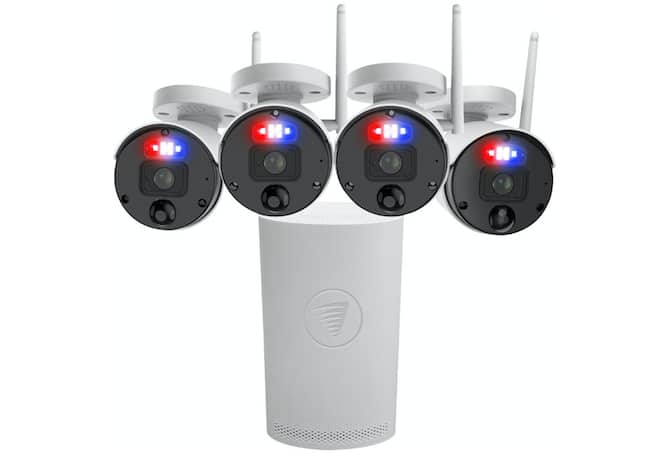11 Tips for an Effective Surveillance Camera System Installation

Best Selling Products carousel(5 Items)
How to install and protect your security cameras
1. Choose the right camera type
The best security camera system for your property is one that includes cameras rated highly for accurate monitoring. While pan, tilt and zoom (PTZ) security cameras may seem like better solutions, most surveillance systems only require fixed outdoor and indoor security cameras. A PTZ camera can cover more area than a fixed camera, but it may require a remote operator to pan, tilt and zoom the camera. Consider a fixed camera with a wide viewing angle if you don't have a dedicated team always monitoring your security cameras. However, PTZ cameras are better for active surveillance if you need to check views in certain areas constantly for suspicious activities and zoom in to watch people's actions closely.
Other types of security cameras to consider when looking for the best security camera system for your home or office include 360-degree and panoramic cameras, models with fisheye lenses and those capable of night vision and thermal imaging. Cameras with panoramic, 360-degree and fisheye lenses offer wider fields of view and allow you to use fewer cameras to monitor large spaces. Security cameras with night vision and thermal imaging can capture images in dim light and low-visibility environments, such as at night and on foggy days.
2. Choose between wired and wireless security cameras
Before you start shopping for home security solutions, decide whether to go with wired or wireless security cameras. Wired cameras are more secure and harder to hack. Since they don’t rely on wireless networks, they also offer more reliable performance. However, they may require professional help to set up. While earlier versions were not as good, most of the current generation of wireless security cameras offer comparable performance to wired models. These models are easier to set up and are the ones to get if you're asking, "Can I install my own security cameras?"
Choose battery- and solar-powered models if you're looking for truly cable-free wireless security cameras. Easy-to-install wireless outdoor security cameras don't require hard-wired power and data connections. Therefore, you can place them anywhere.
3. Don't use indoor cameras outdoors
4. Place security cameras high on the wall
5. Consider lighting when positioning surveillance cameras
6. Adjust your security cameras to the best coverage position
7. Position surveillance cameras to cover points of entry
8. Hide your cameras' cables
9. Consider video storage and retrieval when choosing a surveillance system
When looking for the best security camera system, consider the video storage options. A security camera may record footage to a local storage system or the cloud. Some cameras use memory cards for local storage, while others record to the hard drives of their base stations. However, cloud storage is a desirable option, whether offered as the only option or along with local storage. Besides video storage, the best security camera systems let you view livestreams or recorded clips on your phone and computer via companion apps.
Cloud storage is convenient, as it makes it easy to retrieve security footage even when intruders steal or destroy the cameras that capture them. Surveillance videos sent to the cloud are also much harder to erase, but burglars can easily destroy the memory cards and hard drives used for local storage. Keep in mind that cloud storage often requires additional subscription costs and relies on fast internet connections. These recurring costs are worth remembering when wondering how much it costs to install security cameras.
10. Secure your surveillance camera system
11. Hire professionals to install and set up your surveillance camera system
While you can install a simple home security system yourself, you'll need professional help to set up a security system with more than five cameras. A closed-circuit television (CCTV) surveillance system, with wired security cameras, requires expert help to correctly install, set up and troubleshoot. This is especially true when installing a video surveillance system for a business location. If you're wondering who can install security cameras, contact a licensed professional with lots of experience and excellent reviews from past clients.
In summary, learning how to install security cameras involves knowing which cameras to choose, how to position them, where to place them and protecting them from burglars and hackers. You can set up a simple surveillance camera system yourself but may want to consider hiring a professional for an extensive setup.